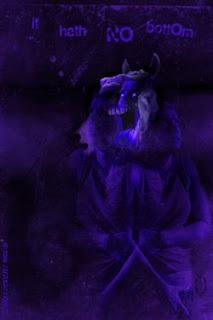The Union of Bottom and Titania
How does this entry relate to Flux’s full production of A Midsummer Night’s Dream?
The sexual union of Bottom and Titania is the heart of Midsummer, and the epiphany that Bottom experiences afterwards is it’s center of gravity. It is a union of the sublime and the grotesque; of the divine and the natural; of the tragic and comic; of the immortal and mortal.
It is also, above all, the union of two characters who deeply need the transformative power of love. By submitting to that power, they both emerge with a greater capacity to experience life.
Titania is love with her own grief. She has spurned her partner Oberon, and obsesses over the changeling boy of her lost Votresse. Her grief, and Oberon’s anger over her lost affection, wreak a terrible toll on the natural world; for her emotional life is intimately connected with her governance of nature. Her partner Oberon, and the world at large, both need her to let go of her grief.
Bottom is an obsessive artist convinced his upcoming performance will only go well if his hand is firmly in every pie. Stressing as much as strutting, he lives solely in the imaginative world of his theatre, but lacks the generosity and trust a true artist needs to create. His play cannot go forward until he learns to let go fully into the human experience.
In one of the great ironies of the play, Puck and Oberon’s malevolent trick meant as punishment serves to release Titania and transform Bottom. Submitting to the incomprehensible power of the Love-In-Idleness, Titania gives away her adored changeling boy without a fight. In the presence of love, her grief is forgotten; and even if we assume her reconciliation with Oberon is a qualified one; her re-emergence as his equal partner is whole hearted. No lounger bound by grief, she is released by the transformative power of love, and so able to once again experience life fully.
And there is extra resonance that this love affair took place with a mortal, made more mortal through his transformation into an animal. Titania’s wound was a mortal one, made by a mortal woman, and so it makes sense Oberon’s love would be unable to salve it.
If Titania’s sex with the mortal Ass heals her mortal wound; Bottom’s brush with the divine creates an immortal one. She has, after all, said:
I will purge thee of thy mortal grossness so,
That thou shalt like an airy spirit go.
Bottom has experienced the limitlessness of the Fairy Land; he has been purged of his mortal grossness, and then returned to it; and his epiphany that follows it is full of longing for what he may never have again, and regret for lacking the words to even say what it was:
Methought I was, there is no man can tell what.
Methought I was, and methought I had.
But man is but a patched fool, if he will offer to say, what methought I had.
The eye of man hath not heard, the ear of man hath not seen, man’s hand is not able to taste, his tongue to conceive, nor his heart to report, what my dream was.
How can you express the divine? How can you bring the ghost into the room? How can you give to airy nothing a local habitation and a name? Bottom doesn’t know, until he sees one way:
I will get Peter Quince to write a ballet of this dream, it shall be called Bottom’s Dream, because it hath no bottom; and I will sing it in the latter end of a play, before the Duke.
Theatre, as Theseus will later agree, theatre is how you say what the eye of man cannot hear, and how you show what ear of man cannot see. Or at least, it’s how we try.
Connecting the sexual union of ass and Goddess so directly to the act of making theatre changes the way we approach the play within the play; it is no longer just a comic gift tacked on to the end, but rather both a celebration of the power and mocking of the limits of the very attempt the play proper has been making. The play within the play should mirror comically our own attempts to give airy nothing a local habitation and a name; and Bottom’s experience should burn through every ridiculous moment of their misguided but heartfelt Pyramus and Thisbe.
After all, when Pyramus says, “my soul is in the sky”, Bottom must be thinking of when his own soul, purged of its mortal grossness, stretched limitlessly across the sky. In that moment, the sublime union of Bottom and Titania is mirrored by the ridiculous disunion of Pyramus and Thisbe; and all the airy nothing of the play lives in the ill-fated attempt of these players, these shadows.





Recent Comments